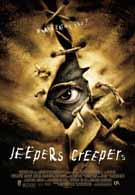In an effort to showcase a creature more monstrous than he, writer and director (not to mention convicted child molester) Victor Salva has found one of the vilest beasts to ever leap through the screen. And no, even though he has made a film about a monster, Jeepers Creepers is not an autobiography. It is a modern horror film that wisely skimps on any cheeky post-modern in-jokes to create one of the most terrifying straight shockers since A Nightmare on Elm Street. Mixing the claustrophobic and freak-show visuals of The Texas Chainsaw Massacre with the on-and-off-road terror of Steven Spielberg’s classic TV-movie Duel, Salva has darted past his reputation to deliver an exercise in pure horror.
Jeepers Creepers opens on a rural road in the middle of nowhere, America, the kind of place where rusty Oldsmobiles go to die, as a bickering brother and sister (Justin Long, Gina Philips) are traveling home from college to visit their family. As they pass an abandoned church in a secluded town, they witness a figure in rumpled brown clothes disposing large, apparently blood-stained bags down a chute. True to horror cinema form, they investigate. What they discover is a tomb of home-mummified corpses, dating back decades. Only some are missing more organs than others. The man behind the murders turns out not to be a man at all, but a demonic beast that, every 23rd spring, for 23 days, gets to “eat.” And by “eat,” I mean remove, and then use, fresh body organs for itself. Now it has just set its not-so-pretty sights on something from one of the two passers-by.
This disturbing concept is established after an unbearably suspenseful first act. Giving the viewer a reason to be frightened is chosen over any consequential dialogue so that the film becomes a tale where the outcome is the most terrifying of all. Jeepers Creepers dishes out one good scare at a time to build up to the eventual set-up. Fifty percent through, the film loses its ferocious momentum to finally explain what exactly is going on. Delaying the details would be all well and good except that the plot is plopped down like cheap veal on a worn-out cutting board. The facts on this beast are eventually dished out by a resident psychic (Patricia Belcher) who coincidentally “senses” everything that it does and why it exists. This lame and lazy gimmick to make us fear the villain comes close to undoing all of the good scares from before. It makes the mistake that many horror sequels make—it tries to explain the back story rather than move forward with something new and in doing siphons away some of the terror.
This important turn is only a bump in the rural road as the film gets back on track for the finale. This is what secures Jeepers Creepers as a traditionally entertaining scary movie. Hope is a toy that is played with, but the conclusion stays true to what is scary, by taking the hope away. The greatest films of this genre are the ones that gave you no absolution, and leave you as uncomfortable after as you were during the film.
The beast, appropriately billed as “The Creeper,” is the second-coming of Freddy Krueger, a monstrous soul-taker with a devilish grin and uniquely articulated body. In place of horrible burns is insect-like protective covering. He (better, it) is the relentless nightmare whose modus operandi is more terrifying than death itself: a creature who will keep on killing, thanks to your not-so-pleasant contribution. An idea so gruesome could only come from an observer of outcasts like Salva (Powder), who makes the Creeper an instinctive predator who must kill to survive.
Director Salva, who was convicted of five felony counts of sexual relations with a twelve year boy in 1988, lets slip what is possibly an obsession because many of the Creeper’s past victims, are, eerily, young males. There is a scene that shows a male teenage victim writhing in pain after it is discovered he has been eviscerated and then sewn up to cover the wounds. The homosexual under-tones are more obvious when taking into account the director’s history and track record (which includes Clownhouse, a tale about three mental patients who terrorize three young brothers). This controversy neither adds nor takes away from Jeepers Creepers, and would more likely spark a discussion about the director himself. Some might be prepared to lash out at his films on this account. They should remember the purpose is to view the art, not judge the artist.











